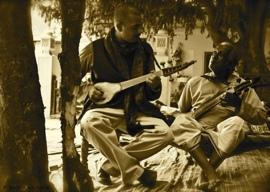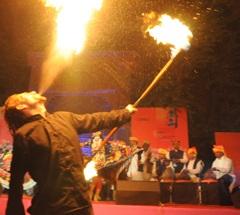
Perhaps it was the squirrels and peacocks leaping in the foliage overhead. Or maybe the way the rambling grounds of the Diggi Palace divided into separate tableaux—here Gulzar, a venerated Urdu poet, recited before a rapt audience, there a pair of London publishers toasted a trio of hard drinking and smoking Kashmiris, while over on the lawn tablas thumped and sittars whined. All this made it hard not to feel like a figure in an outsized miniature, such as those late paintings of the great durbars of the Raj, in which suited British officers faced off against far more splendidly plumed native rulers. Yet the Jaipur Literature Festival, now in its fifth year, is determinedly void of pomp and hierarchy.
With all events free, and plenty of music to relieve the droning of authors, it is a thoroughly cheerful jamboree, attended by giggling schoolkids, Bollywood houris, bearded ideologues and bookish aunties. With Indian power surging in literature as in industry, the festival reflects auspicious celestial shifts, too. Literary stardom seems no longer to be, as it was until recently for all but a few Indian writers, something conferred in London or New York. India’s most famous writers, and especially those who write in English, still tend to live abroad. But they face a rising challenge from those who have remained at home, where the my-funny-Indian-family trope has happily been dumped in favor of hard-hitting investigative reporting from the likes of Basharat Peer on Kashmir, or the team of Tehelka magazine exposing the brutality of police tactics for crushing Maoist insurgents; scouring social criticism from resurgently angry Dalit, or Untouchable writers such as Kancha Ilaiah, Omprakash Valmiki and Des Taj Kali; and teen-bloggers’ exposes of high-class high jinks from young writers such as Meenakshi Reddy Madhavan, Anjum Hassan, and Ira Trivedi. Chetan Bhagat, a Mumbai investment banker-turned-cult novelist, recently scored a first, selling in India alone over a million copies in English of his One Night @ The Call Center.
Much of the fun, as well as the utility of the five-day event, stems from its blending of overseas writing with a subcontinental range that extends from India’s own plethora of native literatures to those of Pakistan, Bangladesh, Sri Lanka, Nepal, Tibet—and this year, even the quaintly remote Kingdom of Bhutan. HS Narula, a construction mogul who sponsors the festival, gave a further boost to regional writing with the surprise announcement that, starting next year, he plans to fund a $50,000 annual prize for South Asian literature.
Namita Gokhale, one of the festival’s co-founders and driving spirits, says that from the very beginning she has sought to avoid its becoming some kind of literature-themed Club Med for frolicking Westerners. In a fortuitous division of responsibilities, Gokhale, herself a prolific writer as well as a publisher, seeks out representative talent from nearby, while the ebullient William Dalrymple, now permanently resident in Delhi, devotes his Tigger-ishly infectious energy to bringing in the best from abroad. This year their combined effort has resulted in well over 200 writers and performers, together with some 20,000—mostly Indian—visitors. The quality and variety made for painful choices about simultaneous events: Claire Tomalin on the art of biography or Michael Frayn reminiscing on his travels? A session highlighting writers from Rajasthan or another on Gujarat? A showcase for the latest Indian chick-lit, chaired by Chetan Bhagat, or a discussion of the Kama Sutra?

There were some exalted moments. Alexander McCall Smith, a rumpled and witty literary maharaja sitting haloed in white hair, explained his prodigious output as the result of rising before dawn and turning out two to three thousand words a day in a sort of mildly dissociative trance. Roberto Calasso, now completing the seventh volume of his encyclopedic evocation of ancient myth, sounded a note of ecstasy that echoed the previous night’s chanting of Sufi qawalis with the pronouncement that “Reading and writing are perhaps the last access left to us to meet with the gods.”
In a starkly utilitarian counterpoint, Lawrence Wright amused a different audience by emptying his backpack to reveal the tools of trade that helped build his Looming Tower, including a fearsomely voluminous legal-pad-sized list of contacts, the slow perusal of which served to intimidate recalcitrant interviewees into squealing, “because they felt surrounded.” Amit Chauduri spoke of writing paragraph by paragraph, seeking form, shape and compression in each, before moving on, while Vikram Chandra spoke about the universality of the detective story, whose formulaic quest has become, in the modern world, “a secular version of the search for meaning.”
Meanwhile, Tina Brown, a Jaipur regular, regaled a lawn-full of celebrity-spotters with tales of Princess Diana, and Niall Fergusson appeared with his date Ayan Hirsi Ali, who shared her own tell-all tales of the wickedness of Islam. There were huddles of uniformed schoolchildren, too, to flatter lesser lights with indiscriminately sweet demands for autographs. The talk that permeated the festival, though, was about how to sustain it in the future without losing its relaxed intimacy, or turning it into a tourist attraction. Gokhale and Dalrymple, who are backed by funding from Narula’s DSC Limited, insist that it will stay in the appealingly unpretentious Diggi Palace, and remain open to all. Let’s hope so.
Advertisement


